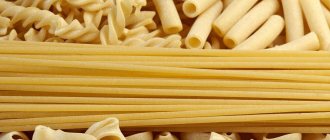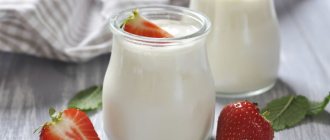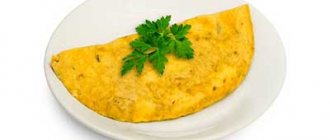Vitamins
Fat-soluble vitamins in a boiled chicken egg include A, beta-carotene, D, D3, E and K. Water-soluble vitamins include vitamins B1, B2, B3 (PP), B4, B5, B6, B9 and B12.
>’> >’> >’> >’> >’> >’> >’> >’> >’> >’> >’> >’> >’> >’> >’> >’> >’>
| Vitamins, content | Share of daily value per 100 g | |
| Vitamin A | 149.0 mcg | 16,6% |
| Beta carotene | 11.0 mcg | 0,2% |
| Alpha carotene | 0.0 µg | 0,0% |
| Vitamin D | 2.2 mcg | 14,7% |
| Vitamin D2 | n/a | 0,0% |
| Vitamin D3 | 2.2 mcg | 13,5% |
| Vitamin E | 1.0 mg | 7,1% |
| Vitamin K | 0.3 mcg | 0,3% |
| Vitamin C | 0.0 mg | 0,0% |
| Vitamin B1 | 0.1 mg | 5,5% |
| Vitamin B2 | 0.5 mg | 39,5% |
| Vitamin B3 | 0.1 mg | 0,4% |
| Vitamin B4 | 293.8 mg | 58,8% |
| Vitamin B5 | 1.4 mg | 28,0% |
| Vitamin B6 | 0.1 mg | 9,3% |
| Vitamin B9 | 44.0 mcg | 11,0% |
| Vitamin B12 | 1.1 mcg | 46,3% |
| Fat soluble Water soluble |
Fats in 1 egg, raw and boiled
Most of the calorie content of the product (160 kcal) comes from the yolks - more than 70%. The total fat content of a raw egg is 11%; when boiled, this figure remains virtually unchanged. One piece weighing 50 g contains 5.5 g of fat.
Yolks contain 30 g of fat (per 100 g), while whites have zero fat.
The yolk contains many unsaturated fatty acids. Some of them are linoleic, oleic, and stearic, representing, respectively, the groups of polyunsaturated, monounsaturated and saturated acids. Due to the cholesterol it contains, daily consumption of the product should be limited to 3 pieces.
Mineral composition
The ratio of mineral substances (macro- and microelements) contained in a boiled chicken egg is presented in the table using diagrams.
>’> >’> >’> >’> >’> >’> >’> >’> >’> >’> >’>
| Minerals, content | Share of daily value per 100 g | |
| Calcium | 50.0 mg | 5,0% |
| Iron | 1.2 mg | 11,9% |
| Magnesium | 10.0 mg | 2,5% |
| Phosphorus | 172.0 mg | 24,6% |
| Potassium | 126.0 mg | 2,7% |
| Sodium | 124.0 mg | 9,5% |
| Zinc | 1.1 mg | 9,5% |
| Copper | 0.0 mg | 1,4% |
| Manganese | 0.0 mg | 1,1% |
| Selenium | 30.8 mcg | 56,0% |
| Fluorine | 4.8 mcg | 0,1% |
How many proteins are in 1 egg (white + yolk)
A significant part of the composition of the egg is made up of proteins - about 13 g per 100 g of product. In 1 piece first category, weighing 50 g - about 6.5 g. The amount of this nutrient in the protein and yolk is different. The yolk contains fewer amino acids, it has more calories, and the protein content does not exceed 16%. The main protein components in the yolk are phosphovitin, livetin, and vitellin.
When cooked, the product does not lose its beneficial properties. Protein content in a boiled egg: 1 pc. – 6 g, in 100 g – 12 g.
The protein contains a protein called ovalbumin (
Report errors and inaccuracies
- Pieces 2.0 eggs
- 0.7 glasses in crushed form 1 glass - how much?
- Weight with waste 113.6 g Waste: eggshells (12% of weight). The calculations use the weight of only the edible part of the product.
Listed below are the nutrient standards that apply to the site.
Chicken eggs are biologically valuable products that should be present in the daily human diet. Thanks to their rich composition, the body receives almost all the elements it needs. At the same time, the nutritional value of this food remains low, which allows the product to be included even in the diet.
Harm to eggs
Everything has a downside. Let's look at why eggs should be eaten in moderation.
- Don't forget that consuming too much protein can harm your body. Just eat your norm: 1.5-2.5 grams of protein per kilogram of a person’s weight.
- There is still debate about whether egg yolks contain cholesterol. However, defenders of this product argue that cholesterol is divided into harmful and beneficial, and eggs contain the latter type.
- There is also egg intolerance. Moreover, they can cause allergic reactions in some people.
- Don't forget that fried eggs contain bad cholesterol. It is better to use them in any other form (preferably boiled).
- You should not eat eggs if you have gallbladder diseases.
Chemical composition
The composition of chicken eggs automatically transfers them to the category of healthy, nutritious food products. Per 100 grams they contain:
- vitamins – A, B1, B2, B4, B5, B6, B9, B12, D, E, H (biotin), K, PP, beta-carotene;
- macroelements - potassium, calcium, magnesium, sodium, sulfur, phosphorus, chlorine;
- microelements – iron, iodine, cobalt, manganese, copper, molybdenum, selenium, natural fluorine, chromium, zinc;
- digestible carbohydrates – disaccharides, monosaccharides;
- sterols - cholesterol.
It is worth mentioning the amino acids separately:
- essential – arginine, valine, histidine, leucine, lysine, methionine, cysteine, tryptophan, phenylalanine, tyrosine;
- replaceable - alanine, aspartic and glutamic acid, glycine, proline, serine.
Protein content
How much protein is in egg white? The product in question consists of 11 percent protein and 87 percent water. The rest is distributed into various minerals and ash. There is virtually no fat in egg whites; all of the calories come from the protein.
Egg white is of the highest quality and can be considered the standard of biological value. From a raw egg, protein is absorbed by half less, so heat treatment is desirable for its absorption.
If we consider 100 grams of an egg, then it contains 12.7 grams of protein. At the same time, there is only 11.1 protein per 100 grams of protein. The yolk contains much more protein. If you take 1 piece, then in a selected egg the protein content in the white reaches 5.6 grams.
Chicken egg calorie content
The calorie content of eggs is quite low. Using the example of a standard table product (category “0”), per 100 g of weight:
- whole – 157 kcal;
- protein - 44 kcal;
- the yolk has 352 kcal.
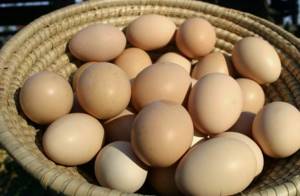
Calories are distributed as follows:
- 10% – eggshell;
- 60% – protein;
- 30% – yolk.
Therefore, if you take a selected egg weighing 65 g and calorie content of approximately 157 kcal per 100 g, it alone has about 102 kcal. Of these, the protein has 61.2 kcal, the yolk has 30.6 kcal, and a share of 10.2 kcal comes from the shell.
Raw
The calorie content of the raw product is 157–157 kcal per 100 g. It also contains:
- proteins – 12.8 g;
- fat – 11.6 g;
- carbohydrates – 0.7 g;
- water – 73.3 g;
- ash – 1 g.
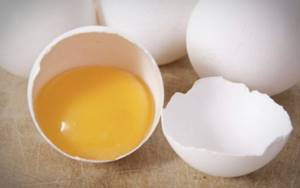
Even for those who don't count calories, raw eggs have the greatest benefits in terms of vitamins and minerals, but at the same time carry a high risk of salmonella infection.
Boiled
The nutritional value of the prepared product depends on the method of heat treatment:
- soft-boiled –157–158 kcal;
- hard-boiled – 127–142 kcal.
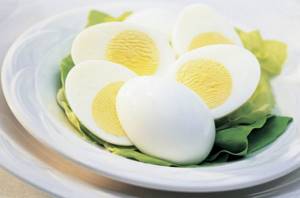
The composition of proteins, fats, and carbohydrates remains virtually unchanged. Although soft-boiled are considered healthier, they are safer if you cook them for 10 minutes. Boiled eggs retain their beneficial properties for 8–10 days.
Fried
The value of a fried product if it is prepared without the use of oil:
- calorie content – 174 kcal;
- proteins – 14.5 g;
- fat – 12.5 g;
- carbohydrates – 0.8 g;
- water – 69.8 g;
- ash – 1.1 g.
If you are on a weight loss diet, it is recommended to fry scrambled eggs without yolks - the whites do not contain fat or carbohydrates. One such omelet for 2 eggs is approximately 90 kcal, while with yolks it is about 220 kcal.
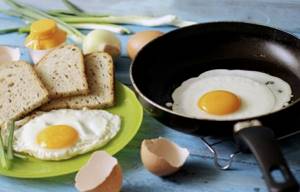
Additional foods increase calorie content by up to 200%.
Energy value of boiled eggs
So, you ate 1 boiled chicken egg for breakfast or dinner. To find out how it fits into your diet, let's see how many calories are in a hard-boiled egg with yolk.
The energy value of one medium chicken egg (40-60 g) is:
- 70–80 kcal for hard-boiled;
- 60–65 kcal - soft-boiled;
- 50–55 kcal for boiled yolk;
- 17 kcal for protein.
If you are making egg salad, then it is more convenient to take into account the calorie content per 100 grams of product, which can be taken from the table.
| Chicken eggs/100 g | Number of kilocalories |
| Raw | 157 |
| Hard Boiled | 160 |
| Soft-boiled | 154 |
| Fried | 200 |
| Boiled with mayonnaise | 145 |
| Boiled squirrels | 44 |
| Boiled yolks | 352 |
It is easy to see that protein is the lowest calorie part of the product. Some weight loss diets recommend separating it from the yolk, which contains 8 times more calories. The energy value of a soft-boiled dish is slightly lower, and in terms of vitamin content it is superior to a fully cooked product.
Effect on the body
The chicken product contains so many useful substances that it has a beneficial effect on several functions of the body: vision, brain activity, bones and muscles. Eggs have the ability to satisfy hunger perfectly and for a long time, are low in calories, do not weigh down with excess fat and contain almost no carbohydrates. Unlike meat, egg white is 98% digestible.
Daily consumption rate:
- for a healthy adult, 1–2 pieces are enough, optimally 5 per week;
- for high cholesterol – maximum 3 pcs. in Week;
- children from one to two years old – 1 per week;
- children two to three years old – 3 per week;
- from four to six years – maximum 5 per week.
Don’t overdo it and don’t forget that this product can be part of other everyday food - cutlets, pancakes, baked goods, etc.
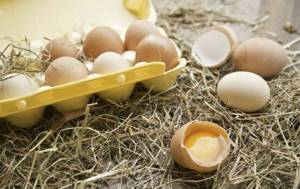
Beneficial features
Daily consumption benefits by providing:
- saturating the body with minerals, vitamins, essential micro- and macroelements;
- muscle tissue growth due to high protein digestibility;
- reducing the risk of vision problems;
- improvement of brain function, memory, mental activity;
- reducing the risk of osteoporosis and increasing bone strength;
- reducing the risk of atherosclerosis.
Harm and contraindications
Negative effects of the product:
- the risk of infection with the pathogen Salmonella when consumed raw and when cooked for less than 10 minutes;
- the presence of antibiotics due to unscrupulous keeping of chickens;
- the presence of nitrates and hormones due to poor quality nutrition of laying hens.
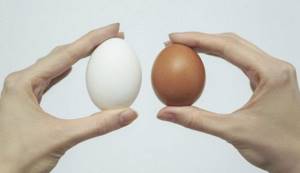
Contraindications and restrictions on use apply to people suffering from:
- allergies (or a tendency to such);
- diabetes mellitus;
- elevated cholesterol levels.
The benefits of eggs for the body
There are at least several reasons to use this product. Let's study them so as not to be unfounded.
- The yolk contains vitamin D, which is necessary for children and adolescents, because it contributes to the proper formation of teeth, bones, skeleton and nervous system. Eggs are second only to badger and fish oil in terms of the content of this vitamin.
- Egg white can eliminate headaches, as it is responsible for normalizing blood pressure in our body. Both arterial and intracranial.
- Vitamin B4, which is contained in protein, has a beneficial effect on the nervous system and activates mental activity.
- Eggs are able to cleanse your body of toxins and expel excess fluid from the body.
- Eggs have a positive effect on the reproductive system of men and women. Since their consumption produces serotonin.
- The presence of folic acid indicates that eggs are a very important product for pregnant women, which helps the fetus develop normally.
- Omega acids cleanse blood vessels and prevent the development of their diseases.
- Vitamin E, which is part of eggs, is responsible for beauty, namely, it helps maintain healthy hair, skin and nails.
- The presence of calcium in eggs suggests that this product helps maintain teeth and bones in good condition.
- Egg white is characterized by rapid digestibility by the body. Moreover, eggs are one of those rare products that are completely absorbed by the body.
- Eggs help avoid depression and mood swings. They relieve insomnia and promote good sleep, so if you have such problems, you should eat this protein product three hours before bedtime.
- Due to their high protein content, eggs are recommended for athletes who want to gain muscle mass.
- Eggs are an excellent product for losing weight. Calorie content 1 pc. boiled egg white is 18 kcal. Agree, very little. Therefore, for weight loss to be effective, it is better to eat eggs without the yolk. Since it contains 64 kcal, which exceeds the calorie content of 1 piece. boiled egg white almost 3.5 times.

Average weight of a chicken egg
There are several categories of eggs, which are determined according to weight:
| Category | Minimum and average weight, g |
| Third | 35–40 |
| Second | 45–50 |
| First | 55–60 |
| Selective (dining room) | 65–70 |
| Higher | 75–80 |
| With two yolks | 80 |
There are also dietary ones, which are marked “D”. Ordinary canteens are marked with the letter “C”. The only difference between them is the shelf life.
The benefits and nutritional value of this product are an indisputable fact, but everything must be eaten in moderation. An excess of beneficial elements can harm the body, which should be avoided.
| Egg | |
| Egg | |
| Components | |
| Basic | egg |
| Recipe on Wikibooks | |
| Media files on Wikimedia Commons | |
Egg
- a common food product. Due to their availability, chicken eggs are currently the most widely used, although any bird eggs can be eaten by humans. In addition, there is the practice of eating the eggs of some reptiles (for example, turtles).
Carbohydrates in eggs
Fans of a healthy lifestyle and those losing weight should not worry about eating chicken eggs, because their carbohydrate content is less than 1 g. More precisely, 0.7 g. A product of the highest and first category, whose weight reaches 80 g, includes about 0.5 g.
A low category and small sized egg will contain between 0.2g and 0.4g of carbohydrates.
The indicator for the yolk (per 100 g of weight) is 1 g, for the white - 0.65 g. Carbohydrates in the product are represented only by sugars. When cooked, the indicator remains virtually unchanged - 0.8 g per 100 g.
Chemical composition of eggs [edit | edit code ]
The composition varies depending on the type, breed, age, conditions of keeping and feeding of poultry [1]:
| Type of eggs | Content, % | Calorie content of 100 g of egg mass, kcal/kJ | ||||
| Squirrels | Fats | Carbohydrates | Minerals | Water | ||
| Chicken | 12,57 | 12,02 | 0,67 | 1,07 | 73,67 | 158/663 |
| Duck | 12,77 | 15,04 | 1,08 | 70,81 | 184/772 | |
| Goose | 13,90 | 13,30 | 1,31 | 1,10 | 70,40 | 180/756 |
| Turkey | 13,104 | 11,80 | 1,20 | 0,80 | 73,1 | 165/693 |
Application in cosmetology
The product is a popular ingredient in home hair and skin care products. Chicken protein is included in masks for those with oily skin. Film masks are made from it that effectively remove blackheads. After use, the skin becomes comfortable to the touch and has a matte color. Another property of protein is that it reduces sweating.
To make a face mask, you need to beat one chicken protein until foam forms and apply to the skin. Place a napkin on top. After drying, remove the napkin from the face and wash it. The skin becomes smooth, cleansed, all impurities disappear.
The product is used in hair care, the protein is mixed with glycerin and applied to the hair, and after 15 minutes it is washed off with warm water. Hair becomes lush and voluminous.
Nutritional value of chicken eggs [edit | edit code ]
An egg consists of egg white and yolk. The yolk contains proteins, as well as fats and cholesterol. Egg whites are 90% water and 10% proteins. The mass ratio of shell, white, and yolk is approximately 3:14:8 [1].
| Average weight of one chicken egg, g | Waste on shell, stack and losses [2] | Conversion factor [ what? ] [ For what? ] (remainder in decimal form) |
| From 48 and above | 12,0 % | 0,880 |
| From 43 to 48 | 12,5 % | 0,875 |
| Up to 43 | 13,0 % | 0,870 |
| Hard-boiled chicken egg. Nutritional value per 100 g of product |
| Energy value 155 kcal 649 kJ |
| Water | 75 g |
| Squirrels | 12.6 g |
| Fats | 10.6 g |
| Carbohydrates | 1.12 g |
| Retinol (vit. A ) | 140 mcg |
| Thiamine ( B1 ) | 0.066 mg |
| Riboflavin ( B2 ) | 0.5 mg |
| Pantothenic acid ( B5 ) | 1.4 mg |
| Folacin ( B9 ) | 44 mcg |
| Cobalamin ( B12 ) | 1.11 mcg |
| Vitamin D | 87 IU |
| Calcium | 50 mg |
| Iron | 1.2 mg |
| Magnesium | 10 mg |
| Phosphorus | 172 mg |
| Potassium | 126 mg |
| Zinc | 1.0 mg |
| Cholesterol | 424 mg |
Composition of a whole egg [edit | edit code ]
The composition of a whole egg includes [ source not specified 2996 days
]: water (85%), proteins (12.7%), fat (0.3%), carbohydrates (0.7%), glucose, various enzymes (protease, dipepsidase, diastase), B vitamins.
Composition of egg white [edit | edit code ]
Egg whites are 90% water and 10% proteins.
List of egg white proteins:
- Ovalbumin (about 54%). Ovalbumin is the predominant protein in egg whites and was one of the first proteins isolated in its pure form in 1889.
- Ovotransferrin or conalbumin (12-13%). Ovotransferrin has an antibacterial effect and, in combination with lysozyme, shows antibacterial synergism.
- Lysozyme (3.4-3.5%). Lysozyme (muram > Composition of egg yolk [edit | edit code]
The yolk accounts for up to 33% of the liquid content of the egg.
The calorie content of the yolk is 352 kcal per 100 g, which is 8 times more than in the protein (44 kcal per 100 g).
The yolk of a 50-gram chicken egg is approximately 17 grams and contains approximately: 2.7 g of protein, 139 mg of cholesterol, 0.61 g of carbohydrates and 4.51 g of fat (according to USDA) [3]. Based on the mass of the yolk, this amounts to, respectively, 16% protein, 0.8% cholesterol, 3.6% carbohydrates and 26.5% fat.
Percentage of fatty acids in yolk:
Vitamin content [edit | edit code ]
100 g of chicken eggs contain the following vitamins [1]:
| Source: USDA Nutrient database |
| Vitamins | Protein | Yolk | Egg as a whole |
| A, mg | 1,26 | 0,45 | |
| B6, mg | 0,01 | 0,37 | 0,14 |
| B12, mcg | 6,0 | 2,0 | |
| E, mg | 3,0 | 1,2 | |
| D, µg | 5,0 | 2,0 | |
| Folacin, mcg | 1,2 | 45,0 | 17,0 |
| Riboflavin, mg | 0,56 | 0,24 | 0,44 |
| Niacin, mg | 0,43 | 0,34 | 0,39 |
| Thiamine, mg | Footprints | 0,18 | 0,07 |
| Pantothenic acid, mg | 0,30 | 3,0 | 1,2 |
| Choline, mg | – | – | 320 |
| Biotin, mcg | 7,0 | 50,0 | 20,7 |
Beneficial features
Nutritionists have calculated that a healthy person should consume about 300 eggs per year in order not to have a deficiency of the elements necessary for the body.
- Complete egg white provides the body with essential amino acids, the lack of which will delay the synthesis of new cells in the body - the blood formula is disrupted, and internal organs suffer.
- Omega-3 polyunsaturated acids have a beneficial effect on the cardiovascular system and are involved in muscle recovery in athletes.
- Choline promotes mental performance and ensures liver health.
- Biotin - the “beauty vitamin” - regulates metabolic processes in the cells of the skin, hair, and nails.
- Vitamin A is a powerful antioxidant and is essential for normal vision.
- Vitamin E - tocopherol - is an essential element for the normal functioning of the reproductive system of women and men.
- Vitamin D is essential for healthy bones and joints.
For those losing weight, boiled chicken eggs are a real godsend. Providing the body with useful nutrients, they are low in calories and force the body to spend additional calories for absorption.
Polyunsaturated fatty acids fight fat deposits without damaging muscles or causing hunger. Boiled eggs are also popular in the diet of athletes, because they are a natural source of amino acids for muscle recovery and growth.
Take note: if you suffer from insomnia, try having boiled eggs for dinner 3 hours before going to bed. They promote peaceful sleep without awakenings and nightmares.
Unfortunately, chicken eggs are an allergenic product: they are contraindicated for those who have egg white intolerance. We must not forget about cholesterol, which is still present in egg yolk. People already suffering from atherosclerosis and thrombosis should eat them with extreme caution, giving preference to the white rather than the yolk. Contraindications to the consumption of egg proteins are cholelithiasis, as well as previous heart attacks and strokes. If you have diabetes, you can afford no more than 1 piece per week. Other people can eat up to 4 pieces a day without harm to their health, and those who are losing weight can eat no more than 2.
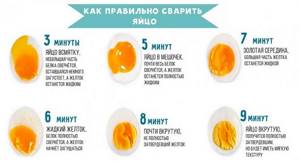
Types [edit | edit code ]
The most commonly eaten eggs are chicken, duck and goose eggs. But turkey, quail, ostrich eggs and eggs of other birds are also eaten.
Different breeds of chickens lay different colored eggs. The color of an egg has nothing to do with its nutritional properties. In Russia and the USA, chicken eggs are usually white or light beige; in the UK they are usually light brown.
In addition to bird eggs, turtle eggs [4] and others are used as food:
| Type of eggs | Average weight of 1 egg, g | Minimum permissible weight of 1 egg [1] [5], g |
| Chicken | 55 | 35 |
| Quail | 10-12 | 10 |
| Duck | 90 | 75 |
| Goose | 200 | 160 |
| Turkey | 75 | 60 |
| Pheasant | 60 | |
| Ostrich | 1000 | 650 |
| Emu | 780 | |
| Guinea fowl | 43-48 | 36 |
Contraindications
The use of protein has a minimum of contraindications. It should not be used only in case of individual intolerance.
https://www.youtube.com/watch?v=ytcreatorsru
It does not contain cholesterol and has a rich composition, so it can be consumed by various categories of people. Low calorie content allows it to be used in dietary nutrition.
Egg product increases cholesterol levels. However, this does not apply to bad cholesterol, but to good one. Hard-boiled yolk causes more harm.
Egg white is a strong allergen, so it should not be consumed if you have an individual intolerance to poultry products. In its raw form, it contains an antitrypsin enzyme, which destroys the digestive enzyme, making it extremely difficult to digest.
Labeling chicken eggs [edit | edit code ]
According to current Russian standards, every egg produced at a poultry farm must be marked. The first character in the labeling indicates the permissible shelf life:
- The letter “D” stands for dietary egg; such eggs are sold within 7 days.
- The letter “C” stands for a table egg, which is sold within 25 days.
The second sign in the marking indicates the category of the egg depending on its mass [6]:
- Third category (3) - from 35 to 44.9 g.
- Second category (2) - from 45 to 54.9 g.
- First category (1) - from 55 to 64.9 g.
- Selected egg (O) - from 65 to 74.9 g.
- Highest category (B) - 75 g or more.
Thus, the marking “SV” is indicated on table eggs of the highest category, and “D1” is indicated on dietary eggs of the first category.
Regardless of the category of chicken egg, manufacturers can give it a number of interesting properties. For example, on the market there are eggs with a bright yolk and two yolks, enriched with selenium [7] or iodine [8].
Egg recipes
As we have already said, we will never know the exact number of existing recipes with the addition of eggs, because almost every day new interesting dishes are invented.
Eggs are a universal product that absolutely all housewives love. It can be fried, boiled, baked. This is one of the required ingredients in many salads, as well as in baked goods: pancakes, pancakes, cheesecakes, cakes, pies, muffins, pastries. Every housewife and every second man knows how to boil and fry eggs.
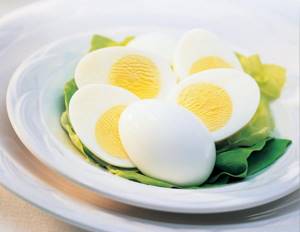
Consider a recipe for a delicious salad with egg pancakes.
